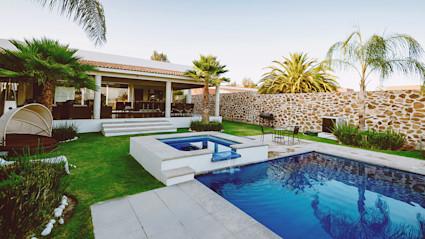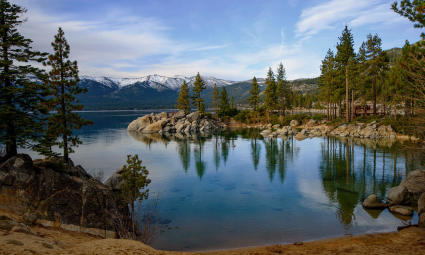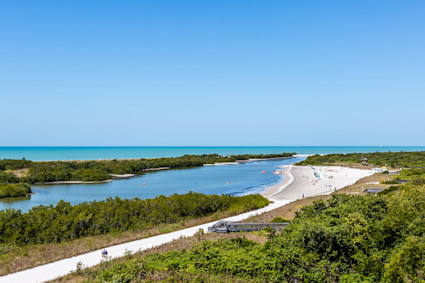Dog-friendly vacations: Best places to visit with your dog in the U.S.
Finding dog-friendly vacation destinations that suit your needs can offer a luxurious and stress-free escape for everyone. It might even lead you to the perfect location for a second home, where every trip is a dog-friendly vacation. What are the best dog-friendly vacations in Hawaii? Maui, Hawaii A dog-friendly vacation in Maui is hard to beat. The island is perfect for outdoor adventures, from exploring scenic trails to relaxing on dog-friendly beaches. Here, you’ll find plenty of things to do with dogs: Enjoy a stroll along the Wailea Oceanfront Boardwalk Trail, or explore one of the island's many dog parks like the popular Kenolio Dog Park in Kihei. What are the best dog-friendly vacations in Washington state? Seattle, Washington Beat the heat with a dog-friendly vacation to the Pacific Northwest. Visit the city’s largest downtown green space at Along the shores of Lake Washington, you’ll find the 230-acre What are the best dog-friendly vacations in Oregon? Bend, Oregon The city of The Riverbend Beach Dog Park is a fenced oasis for your furry friend to socialize in and out of the water. Drink in Bend’s craft beer scene by walking the Portland, Oregon Portland is a fantastic destination for a dog-friendly vacation, with a culture that embraces the outdoors and a very welcoming attitude toward pets. The city is among those with the most breweries in the world, and many have dog-friendly patios, making it easy to enjoy a pint with your pup. The city is also home to one of the largest urban parks in the country, Forest Park, which offers miles of trails for you and your dog to explore. Beyond the city, Portland is an ideal location for a second home, as it provides easy access to the stunning natural beauty of the Pacific Northwest. You can take dog-friendly day trips to the Columbia River Gorge or the Oregon coast for more hiking and beach adventures. What are the best dog-friendly vacations in California? San Francisco, California San Francisco makes our list of best dog-friendly vacation spots thanks to its gorgeous scenery and dog-friendly accessibility. Your dog can splash in salt water at Golden Gate Park’s off-leash section is a viable alternative for dogs wanting to keep sand out of their fur. For an added activity, try the modern treasure hunt known as geocaching, which is great for dogs and children alike. Napa, California Carmel-by-the-Sea, California Carmel-by-the-Sea is a quintessential dog-friendly beach vacations. Among different The real highlight is Carmel Beach, a stunning stretch of white sand where dogs can run off-leash and play in the waves. Afterward, take your pup for a walk along Ocean Avenue, stopping in art galleries and boutiques, to complete a perfect pet-friendly holiday. This idyllic setting also makes an excellent Yosemite National Park While many national parks have strict rules for pets, Yosemite offers several amazing things to do with dogs. Leashed dogs are welcome in developed areas, on paved roads and on many popular trails. This includes the Lower Yosemite Fall Trail, where you and your pup can get a misty view of the waterfall. The Wawona Meadow Loop is another scenic, pet-friendly trail perfect for a long walk. If you’re looking for a Lake Tahoe, California Bring your dog with you as you try your hand at sport fishing, kayaking or paddleboarding. Lake Tahoe’s dog-friendly beaches also provide the option for a restful day soaking up the sun. Stop at the Huntington Beach, California Huntington Beach — aka Surf City, with its 10 miles of coastline — is an evergreen, dog-friendly vacation destination, thanks to its sunny Southern California weather. After a day of frolicking on the beach, try some fresh seafood at San Diego, California Make your dog’s ocean dreams a reality by taking a pet-friendly vacation to For a more sure-footed activity, spend the afternoon at the Palm Springs, California Palm Springs is a stylish escape for a dog-friendly vacation. The desert city has a welcoming atmosphere for pups, with many luxury hotels and vacation homes offering pet amenities. You and your companion can explore the desert landscape on trails like those at Whitewater Preserve. When you're ready to relax, Palm Springs has countless dog-friendly restaurants with patios, perfect for enjoying a meal or a cocktail in the sunshine. If you’re What are the best dog-friendly vacations in Idaho? Boise, Idaho If you and your hound are tired of being confined indoors, Boise is a perfect pet-friendly escape. Tree-lined paths link the Winstead Park offers designated off-leash hours throughout its 11 acres of green space. The Spacebar Arcade lets you drink and play games with your dog by your side. And your pup is welcome at the What are the best dog-friendly vacations in Montana? Whitefish, Montana The Whitefish Trail system provides miles of hiking and biking trails where your dog can explore with you. After a day of adventure, enjoy a meal at one of the many dog-friendly restaurants in town. What are the best dog-friendly vacations in Colorado? Aspen, Colorado From hiking to the iconic Maroon Bells to exploring the many trails on Aspen Mountain, there are endless things to do with dogs here. The downtown area is also very walkable, with shops and galleries that welcome well-behaved pups. Colorado Springs, Colorado Get away from big-city vibes and get back into nature in Colorado Springs. The impressively named For the less adventurous, Colorado Springs has plenty of places to go with a dog. Denver, Colorado Denver is a premier destination for a dog-friendly vacation, with a culture that balances city life and outdoor adventure. The city is full of dog parks, breweries with pet-friendly patios and a vast number of trails. You and your pup can get a unique view of the famous Red Rocks Amphitheatre by hiking the trails at Red Rocks Park. The city’s proximity to the Rocky Mountains provides easy access to endless outdoor activities. It’s also ideal for day trips with your dog, from hiking in the foothills to exploring charming mountain towns like Golden. What are the best dog-friendly vacations in Utah? Kanab, Utah You have to see Kanab to believe it. Known colloquially as “Little Hollywood,” dozens of movies and television series are filmed in and around the area’s national parks due to the striking scenery. Your dog can join you as you walk remote trails, or you can both jump in a 4x4 for a guided desert safari. Be sure to stop by the What are the best dog-friendly vacations in Arizona? Sedona, Arizona Scottsdale, Arizona Scottsdale is a fantastic option for a dog-friendly vacation. This desert city combines upscale living with easy access to nature. You and your pup can explore the vast trail system at the After a day of exploring, relax at one of the many pet-friendly restaurants in Old Town Scottsdale. This is also a great place to buy a vacation home, offering a year-round sunny escape and a welcoming community for you and your dog. What are the best dog-friendly vacations in New Mexico? Albuquerque, New Mexico This Southwest city is well-known for its delicious food and lively festivals, but its reputation as a pet-friendly destination is also noteworthy. Your leashed dog can join you on an outdoor adventure along the La Luz Trail, much of If you need to give your paws a break, hitch a ride on the open-air What are the best dog-friendly vacations in Texas? Austin, Texas Austin is one of the best dog-friendly vacations in the United States! Prepare for sensory overload at the When you need a little extra energy to make it through the day, or maybe just to burn some of your pet’s energy, head to the What are the best dog-friendly vacations in Illinois? Chicago, Illinois Bring your pet to this lakeside city for fun on and off the water. Multiple Montrose Dog Beach allows your pet to dip their paws in the lake and even provides free waste bags and a dog wash area. The pet-friendly What are the best dog-friendly vacations in Wisconsin? Milwaukee, Wisconsin Stroll Milwaukee’s winding Treat your good dog to a spa day at Madison, Wisconsin Sitting on an isthmus between two lakes, Madison has a whole lot of green space perfect for traveling dogs, including For two-legged visitors, The BarleyPop Tap and Shop is another dog-friendly taproom with an extensive craft beer selection. If spirits are more your thing, the What are the best dog-friendly vacations in Michigan? Grand Haven, Michigan This cozy western Michigan town offers plenty of fun for you and your pup while avoiding the overwhelming crowds of some better-known dog-friendly getaways. Take your time as you stroll down the Rent your own pontoon for a relaxing cruise or a water skiing excursion. Then step back into a time capsule at What are the best dog-friendly vacations in Ohio? Hocking Hills, Ohio Hocking Hills is a stunning natural wonder and a top spot for a dog-friendly vacation. The area is famous for its breathtaking waterfalls, caves and gorges, with a variety of trails that are welcoming to leashed dogs. Hiking is a must-do here — your pup will love exploring the trails to iconic spots like Cedar Falls or Old Man’s Cave. A private cabin rental from a company like Dog Friendly Hocking Hills is the perfect pet-friendly accommodation, offering a cozy and secluded home base. What are the best dog-friendly vacations in Virginia? Shenandoah Valley, Virginia Virginia may be for lovers, but it’s also great for your fur baby. Shenandoah Valley has dog-friendly wineries, nature trails and other activities. Explore the trails in Shenandoah National Park or Shenandoah River State Park, then take your dog to White Oak Lavender Farm, where you can enjoy a glass of wine in the dog-friendly tasting room and patio. The What are the best dog-friendly vacations in North Carolina? Asheville, North Carolina If the Southeast is more your style, grab the leash and head to Asheville, North Carolina. Take a stroll through Asheville has trolley tours for dogs up to 25 pounds, or you can scratch nature’s itch with a walk through What are the best dog-friendly vacations in South Carolina? Charleston, South Carolina Fans of the macabre won’t want to miss the city’s Hilton Head, South Carolina You can stick to living on island time at pet-friendly The What are the best dog-friendly vacations in Florida? St. Augustine, Florida St. Augustine, the oldest continuously inhabited city in the U.S., is brimming with history for you and your pet to experience together. In town, you can take your dog on a wine-tasting tour in a horse-drawn carriage or ride on Miami, Florida Miami is a fantastic spot for a dog-friendly vacation, combining a lively city atmosphere with beautiful beaches. While some beaches have restrictions, many parks and trails are welcoming to dogs. South Pointe Park is a popular choice, with a grassy area and a walkway along the water perfect for a stroll with your pup. The city's vibrant art scene also offers dog-friendly activities, with many outdoor cafes and galleries that welcome pets. With its beautiful weather and energetic vibe, Miami is a sunny retreat for you and your dog. The Keys, Florida Your leashed dog can stay by your side as you tour the local aquarium and witness shark feeding and alligator exhibits. You won’t want to miss your chance to dine on fresh seafood like fish tacos at What are the best dog-friendly vacations in Pennsylvania? Philadelphia, Pennsylvania The City of Brotherly Love extends its hospitality to four-legged friends. Visit For a break from the concrete jungle, head to the What are the best dog-friendly vacations in New Jersey? Jersey Shore, New Jersey The Jersey Shore is an iconic summer destination and a surprisingly great option for a dog-friendly vacation, especially during the off-season. While many beaches have seasonal restrictions, towns like Asbury Park are known for their welcoming atmosphere toward pups. Take your dog for a stroll along the historic boardwalk and enjoy the scenery. You’ll find plenty of dog-friendly activities and restaurants with patios where you can grab a bite. The Jersey Shore is a great spot for pet-friendly weekend getaways or a second home, with a classic coastal lifestyle and plenty of fun for your furry friend. What are the best dog-friendly vacations in New York? Long Island, New York The largest island in the country offers dog-friendly beaches, hiking trails and more. Take your dog walks up a notch by strolling around the Long Island has plenty of dog-friendly breweries, and there’s even a tour that takes you to all of the best neighborhood taprooms. Lake Placid, New York There’s so much to experience in Lake Placid. Enjoy a convenient stay at the pet-friendly Town House Lodge, just a stone's throw away from the lake and a short walk from Main Street. Rent a boat from The What are the best dog-friendly vacations in Vermont? Stowe, Vermont Stowe has no shortage of dog-friendly vacation ideas. The What are the best dog-friendly vacations in Massachusetts? Nantucket, Massachusetts This Northeast dog-friendly vacation spot has beaches, brewskies and bogs to entertain you and your dog. Surfside, Brant Point and Cisco Beaches all provide sandy ocean fun. Take a ride on the When it’s time to rehydrate and replenish your calories, head to the Sandbar at Jetties Beach for fresh food and refreshing drinks. In terms of dog-friendly vacations, this one is hard to top. What are the best dog-friendly vacations in Rhode Island? Block Island, Rhode Island When it comes to dog-friendly vacations, Block Island is one destination you won’t want to miss. From scenic walks to water taxis, there's so much for you and your pup to enjoy together. Brenton Point State Park offers beautiful views of the bay, with kite fliers taking advantage of the gusty ocean winds. Have a picnic at Grab a bite to eat at What are the best dog-friendly vacations in Maine? Bar Harbor, Maine If you and your furry friend share a love for the ocean, the seaside town of Bar Harbor is one of the best places to take your dog. This quiet town of 5,000 provides nature cruises for leashed pets, so you both can try spotting a variety of sea creatures, like porpoises and seals. Take a picturesque walk around dog-friendly What are 10 tips for planning a dog-friendly vacation? Taking a vacation with man's best friend requires some extra planning, but with some careful preparation, it'll give both you and your pup something to wag about. 1. Prepare for the road Before you hit the road, make sure your pet is primed for the journey. Pack essentials like food, water, bowls, a leash and any necessary medications to set your pack up for success. Ensure your pet's identification and vaccinations are current, and consider a microchip for extra safety. If traveling by car, secure your pet with a harness or carrier, and plan for frequent breaks for potty stops and exercise. After all, a tired pup is a happy pup! 2. Research the right destination When selecting a dog-friendly vacation destination, consider the climate and specific activities you and your pet will enjoy. Research pet-friendly parks, beaches, trails and attractions ahead of time so you won't have to pivot on the fly based on an unexpected "No Pets Allowed" sign. Look for destinations with a welcoming atmosphere for dogs, where you can find pet-friendly accommodations, restaurants and services. 3. Book pet-friendly accommodations Sites like Sites like 4. Look for dog-friendly dining and relaxation locations After a day of exploring, treat yourself and your furry friend to some delicious eats, a local beverage or some Remember to always confirm pet policies beforehand to ensure an enjoyable experience for you and your pet. 5. Consider the mode of transportation How you’ll get to your destination depends on how far away from home you’re going, of course, but you’ll also want to consider your dog’s comfort. Some dogs are perfectly fine flying on an airplane, but it can be traumatic for others. Some dogs love a road trip, while others don’t like being stuck in a car for a long time. Consider your dog’s personality before plotting your course. 6. Test your pet’s travel tolerance Before you go on a vacation with pets, see how they respond to being cooped up or in a car for long periods. You may discover they get motion sickness or need more frequent breaks than you were prepared for. 7. Make a dog-friendly vacation itinerary Think through the places you want to visit on your vacation. The great outdoors is almost always a safe bet for dog-friendly vacations. Hike scenic Many national and state parks welcome leashed pets, offering opportunities for exploration and bonding. For example, in Austin, Texas, you and your furry friend can explore the 8. Pad your travel schedule Even a well-trained dog can act out of character in new or unfamiliar environments. Allow for extra time for your four-legged friend to get acclimated so you don’t miss out on sought-after activities or reservations. 9. Update your pet’s identification and vaccinations Make sure their collar or chip has your current contact information. This way if you get separated while on vacation, they can be identified and reunited with you. On top of that, double check that all of your pet’s vaccinations are up to date. Many businesses, including 10. Bring extra supplies Pack more waste bags, medications and other necessities than you think you’ll need, just in case. Don’t forget to pack food, a water bowl and a few items to help your pet feel comfortable, like a portable dog bed and a few of their favorite toys and treats. Why should I own a dog-friendly vacation home with Pacaso? Traveling with your dog can be stressful (especially if you travel often) when it comes down to planning all the logistics like deciding whether to leave your dog behind or finding a dog-friendly accommodation that lets you bring your pup along. Just like humans, most pets enjoy a sense of familiarity and routine. As a Pacaso second home owner, you enjoy all the comforts of home without the hassle. While man’s best friend makes a great companion on your travels, pet-friendly vacations require special planning. Consider
Read












